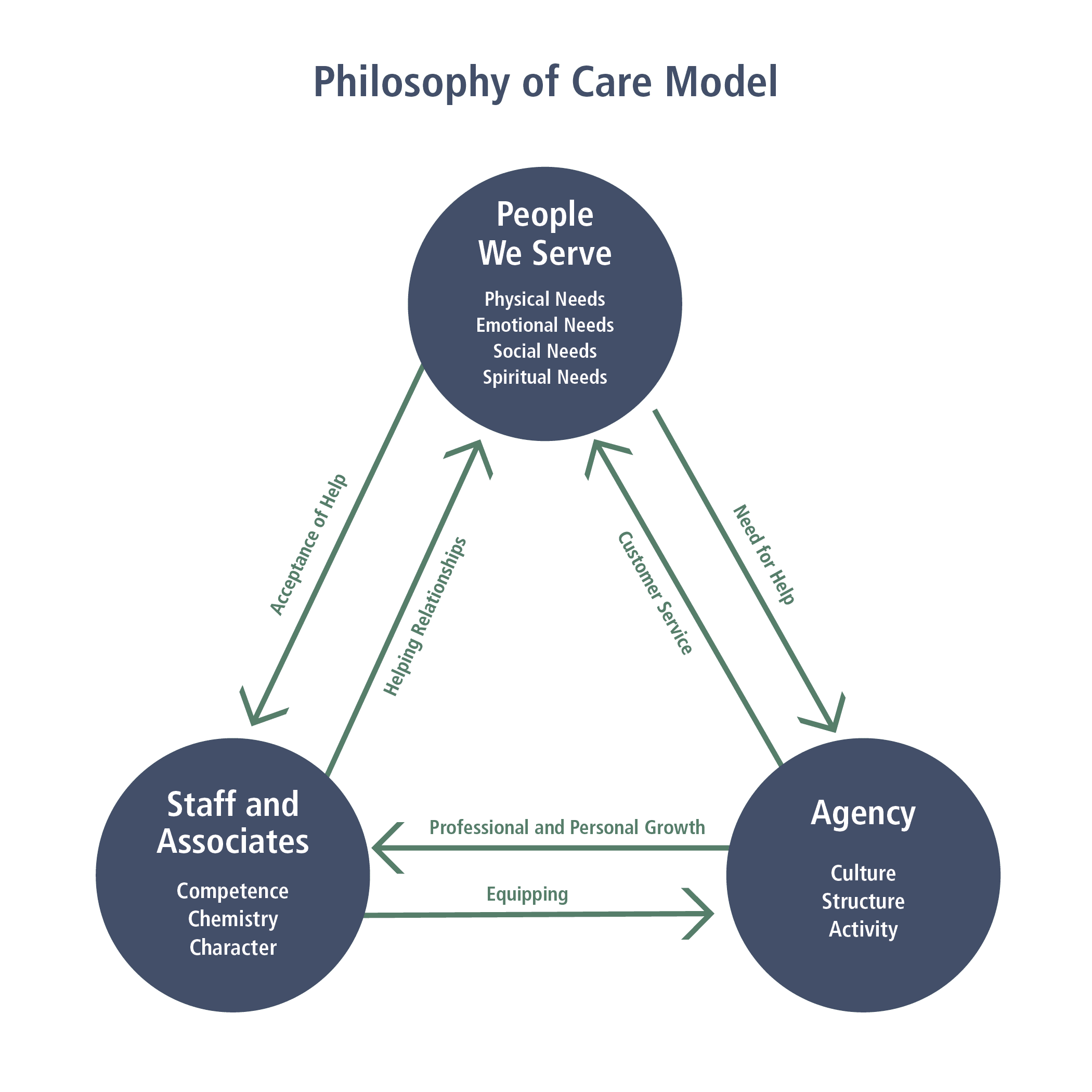Why Access?
Our Philosophy
of Care
The mission of Access Services is to empower and serve people in need of specialized supports by providing innovative services that improve their ability to live fulfilling lives in the community.
In order to fulfill this mission, Access Services is guided by a comprehensive Philosophy of Care that inspires us to pursue excellence in all aspects of our work, and directs our path as we move forward. Our expectation is that this philosophy will be well understood and faithfully practiced by our staff and associates.

Overview
The Philosophy of Care identifies three distinct, yet interactive groups in our organization: People We Serve, Staff & Associates, and the Organization.
It defines the nature of these groups and the way in which they work together to achieve our mission.
We believe that all people are valuable and unique. Our approach is holistic and person-centered, and we seek to address the four basic areas of human need in the life of each person we serve – physical, spiritual, social and emotional. Our purpose is to help each person learn to meet these needs so that they can lead a productive and meaningful life.
Part 1
People We Serve
The first group is made up of the people we serve. The main aspects of this group include meeting their physical, social, emotional, and spiritual needs.

Physical Needs
We believe that healthiness is essential for enabling people to meet the challenges they face every day. Physical needs include:
- Sleep
- Exercise
- Safety
- Privacy
- Shelter
- Proper nutrition
- Good and coordinated healthcare
- Supplies needed for proper healthcare
Emotional Needs
A person’s emotional health is critical to their overall well-being. Each of us must be assured of our value and worth, in our own eyes, in the eyes of others, and also in the eyes of God. The building blocks for good emotional health include:
- A positive sense of self-worth and an identity that is whole and integrated.
- An understanding of our purpose for being alive.
- A deep sense of belonging to our earthly community and to God.
- The security that comes from knowing who we are, how we fit, and our purpose.
Spiritual Needs
We believe all people need opportunities to explore and express their spirituality. Meeting spiritual needs takes place when people have the opportunity to:
- Express personal values and beliefs.
- Worship with a faith community of their choice.
- Experience hope for the future.
- Know and develop a relationship with God.
Part 2
Staff and Associates
The second group is made up of our staff and associates. This group includes provider homes, volunteers, independent contractors and employees.
Access Services considers each person to be unique, with differing skills, abilities and strengths. We rely on this variety of gifts to build well-rounded teams. Staff and associates are placed within the organization in positions which maximize their strengths and enhance their contributions to our agency.
Each person needs to possess three qualities that are essential to providing excellent service: competence, chemistry and character.

Competence
It is crucial for employees in all levels of the organization to have the knowledge base and skills to do their jobs well. Staff and associates are invited to build a skilled community whose primary purpose is to serve others and achieve positive outcomes. We believe that learning is a lifelong task, and expect all staff to pursue learning and personal development. Each staff person should exemplify:
- Excellence in job performance.
- A knowledge base to do the job effectively.
- A desire to excel and grow in one’s field of work.
- The ability to communicate thoughts and ideas.
Chemistry
We strive to achieve the positive dynamic that can develop among people who work together successfully as a team. It generates energy, unity, and joy as they pursue common goals. Staff and associates at Access Services should:
- Demonstrate an ability to work with the people we serve.
- Be able to work in teams.
- Value diversity.
- Utilize the supervisory process.
- Respect the leader/follower relationship.
- Manage conflict effectively.
- Dedicate themselves to the mission that binds us together.
Character
We seek the integration of moral attributes that make up and distinguish a person with integrity. Good character moves a person to do the right thing despite pressures or temptations, and to act honorably in all circumstances. Our desire is for our staff and associates to understand, commit to, and act on shared ethical values.
Part 3
Organization
The third group is the organization. The three main aspects of an organization are its culture, structure and activity. In a healthy organization these three elements work cohesively and build a solid foundation.
In order for our organization to be successful we must be intentional about what we believe, our activities, and the way in which we accomplish our work.

Culture
The culture of an organization is the set of shared attitudes, values, goals and practices which bind all parts together. Access Services’ goal is to maintain an energetic organizational culture that exemplifies its core values. Culture gives an organization a distinct identity and forms the basis of how we work with each other. Factors that determine our organization’s culture include:
- Mission and vision
- Philosophy
- Core values
- Commitment to continuous quality improvement
- Commitment to be a learning organization
- Servant leadership
- High regard we hold for the people we serve, and our staff and associates
- History, storytelling and traditions
- Celebrations
Structure
The purpose of our structure is to create a healthy and productive work environment. This setting should be a place where each person receives support, encouragement and the opportunity for growth. Such an environment is essential if staff is expected to take risks, develop new skills and accept challenging work. Our structure includes:
- A formal hierarchy of authority that includes associate participation and collaboration
- Policies and procedures
- Committees and work groups
- Defined interactions
- Teamwork based on participatory management principles
- An administration dedicated to providing support to program staff
- Networking
Activity
The activities of Access Services are the actual tasks in which we engage in order to further our mission. Examples of important activities include:
- Work performed with the people we serve such as direct care and planning sessions
- Management related work such as strategic planning and project management
- Supervision, support and evaluation of staff and associates
Part 4
Key Interactions
The first three sections above discussed characteristics of the three groups: People We Serve, Staff and Associates, and the Organization. In order to provide a service, these three groups must interact. These key interactions are the shared responsibility of the parties involved.
Each interaction has unique qualities and tasks that must be completed in order for the service to be effective. This section discusses the key interactions between each group and their defining characteristics.

People We Serve and the Organization
The key interactions between the people we serve and the organization are based on a customer orientation. Each person we serve meets the mission criteria of the organization and seeks its help and support. The organization is responsive, flexible and competent in arranging service to meet this need in a timely manner. The organization and the person receiving services participate in this interactions as equal partners.
Need for Help: In this interaction the responsibility of the person receiving service is to bring the need for help to the attention of the organization. This interaction is characterized by:
- Recognizing there is a need.
- Making a request for help.
- Being willing to receive and participate in the organization’s help.
Customer Services: In this interaction, the responsibility of the organization is to provide customer service, which is characterized by:
- Assessing needs, planning services, identifying resources or referral sources.
- Seeking input from the customer.
- Providing information and education about services.
- Responding to the needs of the customer.
- Being flexible in the design and implementation of services.
- Adjusting to changing needs in a timely manner.
Staff & Associates and the Organization
Access Services values each staff person and is committed to each one’s professional and personal growth, equipping each to serve others. In turn, staff members should be committed to their own professional and personal growth. Each staff member should also have a commitment to the mission, philosophy, values, culture and priorities of the organization.
Professional and Personal Growth: In this interaction the responsibility of the staff/associate is a commitment to professional and personal growth which is characterized by:
- Commitment to the agency’s mission, philosophy, values, culture and priorities.
- Commitment to and active participation in the betterment of the agency.
- Self-awareness of personal and professional needs.
- Commitment to learning.
- Application of learning to their work.
Equipping: In this interaction the responsibility of the agency is to equip the staff and associates to do their work effectively. Equipping is characterized by the agency’s commitment to:
- Assess the development needs of each staff person.
- Equip staff to carry out their work assignments.
- Supervise staff with consistent oversight, support, and feedback to staff.
- Develop each staff person.
- Invite each staff person and associate to participate in carrying out the mission of the agency.
- Provide accountability throughout the organization.
- Place staff in positions suited to their areas of giftedness.
People We Serve and Staff & Associates
The people we serve and the key interactions of the staff/associates are based heavily on the helping relationships that are established. The staff/associates must have knowledge and skills in order to develop an effective helping relationship. People receiving services have responsibilities in the helping process as well.
If either party is not living up to their part of the relationship, then the services offered will not be effective. Individuals and their families should be an integral part of the service delivery. The people we serve then can make meaningful choices for services that lead to positive outcomes around their personal goals.
The Helping Relationship: In this interaction, staff are responsible to develop an effective helping relationship which is characterized by:
- Understanding and use of the helping skills.
- The elements of equality, mutuality, reciprocity, genuineness, accountability, value and trust.
- Recognition that the purpose and focus of the relationship is to meet the agreed upon goals of the people we are serving.
Acceptance of Help/Commitment to Growth: In this interaction, the person receiving services is responsible to actively engage in the helping process. The acceptance of help/commitment to growth occurs when the person we are serving:
- Recognizes the need and makes a commitment to change.
- Is willing to negotiate.
- Makes a commitment to the work agreement.
Closing
Invitation to Participate
We believe that the Philosophy of Care is a set of good ideas that informs us in the way we should do our work. Turning those ideas into reality is never easy and requires us to be intentional in what we do every day. There are a variety of things that each associate can do to participate in making the Philosophy of Care work. These things include the development of support plans, training, case reviews, supervision, planning and defining priorities.
Continue to read and study this document and discuss these ideas with your colleagues and supervisors. Participate in training, staff meetings and case reviews in a way that brings these ideas into action. Our invitation to each associate is to participate in making the Philosophy of Care a reality. By working together in these ways we can make a significant impact in the lives of the people we serve.





Social Needs
All people need to have social relationships through which they can share their lives with others. We can build community when we participate fully with others and make our own contributions toward our community’s enrichment. This happens as members practice: